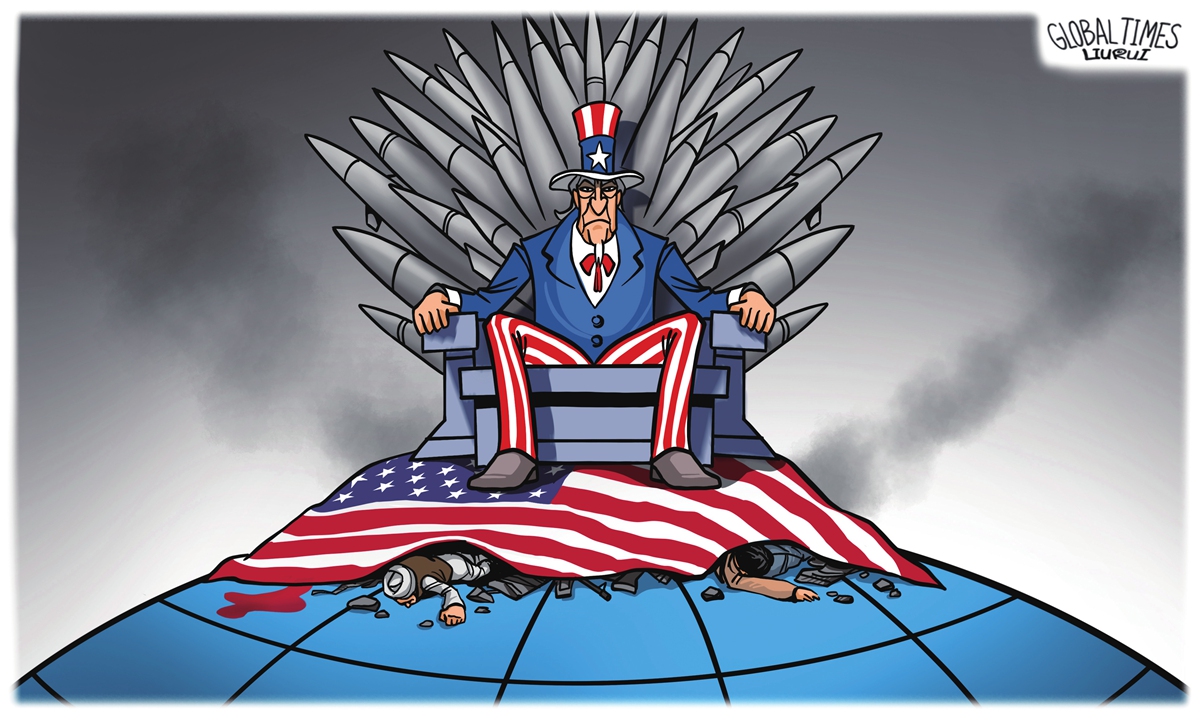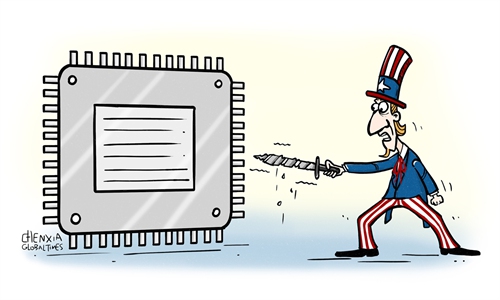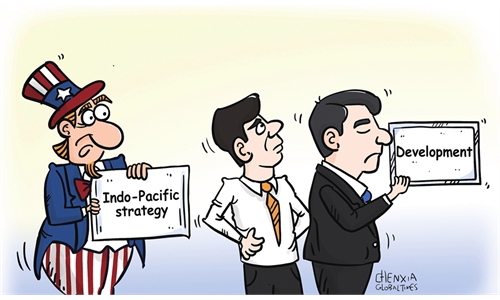
House of Hegemony Illustration: Liu Rui/GT
Editor's Note:
A lack of democracy in the US is dangerous as it increases the possibility that the US will pursue unpopular, brutal wars abroad as the views of the people are not listened to, said Fiona Edwards (Edwards), the No Cold War (a worldwide organization against the US-led New Cold War) British organizer. In an interview with Global Times (GT) reporter Liu Zixuan, she noted that instead of focusing on tackling the crises they have caused at home, US mainstream politicians are attempting to impose their will on the majority of humanity in order to maintain the US' global dominance.
GT: What do you think of the 2022 midterm elections in the US? The "red wave" represented by Donald Trump did not appear. From the perspective of bipartisanship and social division in the US, what do the results of this election show?
Edwards: The results of the US midterm elections defied expectations that Trump would lead the Republicans to a crushing victory over the Democrats. The Republicans' lackluster performance comes despite the fact that the current Democratic administration is failing to deliver a progressive agenda at home as living standards fall, as well as Joe Biden's own approval rating which is hovering around 41 percent.
Despite the unpopularity of the Democrats, the party managed to outperform expectations at the ballot box. There is evidence that both women and young people mobilized in the midterm elections for the Democrats in order to defend abortion rights against the huge attacks unleashed by the Republican-dominated Supreme Court's decision to overturn Roe v. Wade in June this year. Exit polls show that 72 percent of women aged 18-29 voted for the Democrats in the elections for the House of Representatives. Among young voters of both genders surveyed in another exit poll, 80 percent favored legal abortions, and 49 percent named abortion as the issue that sealed their vote. 62 percent of women under the age of 45 named abortion as their top issue.
These elections are clearly a significant setback for Trump. Even before the midterm elections, a poll in October showed that 43 percent of Republicans did not want to see Trump run for president in 2024. While Trump is weakened, the Trumpist political bloc remains dominant within the Republican Party. The new rising star of the Republican right, and Trump's clear rival for the Republican nomination to run for president in 2024, is Florida Governor Ron DeSantis, who shares Trump's hard right politics.
The midterm elections will not change the overall priorities of the US political establishment. Both the Democrats and Republicans are in agreement that the main priority for the United States is to maintain US hegemony and stop the rise of China. The Biden administration's increasing aggression toward China will continue, including moves to erode the US' support for the one-China principle through provocative statements and actions on the Taiwan question.
GT: Economic issues have always been at the center of US elections, but neither party has been able to come up with an effective solution. The election focused on topics such as "defending democracy." How would you rate the current state of the US electoral system? Can American-style democracy solve the real problems facing voters?
Edwards: The US' relative economic decline versus China has accelerated during the pandemic. China's rise is regarded as an existential threat to US hegemony, and the consensus in Washington is that this trend must be stopped. Neither the Democrats nor the Republicans have a plan to boost economic growth in the US, so instead the focus will be on attempting to slow down China's economy through Cold War tactics.
Neither of the two main political parties in the US is focused on solving the problems of ordinary people in the US such as halting the fall in living standards, creating jobs, or providing better healthcare, education, and infrastructure. Instead, the focus is on ratcheting up economic warfare against China aimed at stopping China from advancing technologically at the same time as increasing US military spending. This anti-China policy is against the interests of the American people who will suffer lower living standards as a result of it. The American people are not given an electoral choice in this matter, as all mainstream political parties and media outlets put forward the same narrative and position.

Fiona Edwards Photo: Courtesy of Edwards
GT: As you put it, "The US spends trillions of dollars on brutal wars which kill people & destroy infrastructure. Infrastructure within the US is crumbling due to a lack of investment." For Americans, is the ballot box an effective way to change this?Edwards: Unfortunately, the US political system is not very democratic. It serves the interests of billionaires, not the people. The mainstream media in the US is also under corporate control, and alternative platforms are increasingly censored, which is narrowing public debate.
This lack of democracy is dangerous as it increases the possibility that the US will pursue unpopular, brutal wars abroad as the views of the people are not listened to.
The American people are not completely powerless, however. Through big mobilizations of social movements, it is possible for the people to influence the public debate. The Black Lives Matter movement, for example, has had a tremendous impact on public consciousness in the US. This movement played a key role in stopping Trump from being re-elected in 2020. The growing movement against climate change in the US has also had an impact but has not yet succeeded in winning the concessions necessary for the US to seriously tackle climate change.
GT: The US is deeply engulfed in multiple crises at home, yet it is still "extremely bellicose" externally. The American democratic system seems to have been reduced to a tool for a few elites to maintain hegemonic rule and reap profits. What do you think?
Edwards: The US is engulfed in many severe crises. Mass shootings take place regularly, including in schools; over 1 million people in the US have died from COVID-19 over the past three years; half of US adults say they have difficulty affording the cost of health care; living standards are falling as inflation soars; and over 2.3 million people are incarcerated in the US, the highest prison population in the entire world. Yet the US political establishment is holding up the US as a "model" for the world and is attempting to portray China as enemy of the US population.
US mainstream politicians should be focused on tackling the crises they have caused at home, but instead they are attempting to impose their will on the majority of humanity in order to maintain the US' global dominance. This includes spending trillions of dollars on the military and pursuing an increasingly aggressive foreign policy.
Following its withdrawal from Afghanistan, ending the 20-year "War on Terror" has not made the US more "peace loving" but instead made the US focus on new targets. The US is currently pouring tens of billions of dollars' worth of military aid into Ukraine in order to prolong NATO's proxy war against Russia. At the same time, there are many hawks in US foreign policy circles who are talking up the possibility of a hot war with China. To push the US toward hot wars with other nuclear-armed states is a truly terrifying prospect that could lead humanity to a total catastrophe. It is clear that the main enemy of humanity is these warmongers in Washington.
GT: During COP27, you tweeted: "The greatest obstacle to solving the climate crisis is the US ruling class and its desire to maintain hegemony through colossal military spending to bully most of the world." What do you think of the swings in policies in the US?
Edwards: Of course, having a US president who acknowledges the existence of climate change and the need for action is welcome. As well as re-joining the Paris Agreement, his presidency has passed a law this year, the Inflation Reduction Act, legislating the biggest investment in clean energy solutions in US history: $369 billion over 10 years, or $36.9 billion a year. Estimates suggest this will cut US emissions by 40 percent by 2030, which is a step forward but completely insufficient to achieve the UN target of limiting global warming below 1.5 degrees Celsius.
Unfortunately, whichever president is in power, the US continues to prioritize its aggressive geopolitical agenda over solving the climate crisis. The US' military budget of $722 billion for 2022 is 20 times higher than the spending on climate in the Inflation Reduction Act.
What's interesting, though, is that the US population is largely behind measures to tackle climate change. Because of the new climate spending law, the Republicans right predicted that the Democrats would have disastrous results in the recent midterm elections. This did not happen, and polling shows 65 percent of the population agrees with the bill's measures to support renewable energy.
GT: As the organizer of "No Cold War Britain," you have repeatedly criticized the attacking of China by some Western countries led by the US. What are the main ways for you to arouse public consciousness? To what extent can it change the public's perception of China?
Edwards: There is a relentless propaganda campaign in the West that aims to portray China as our enemy. This campaign is so extreme that there are even attempts to smear China's historic achievement of bringing 850 million people out of poverty in 40 years as somehow sinister.
Britain is suffering from a serious cost of living crisis. The trend is set to continue, with annual inflation at 11 percent. The government is making cuts to public services at the same time as maintaining high military spending.
China is the world's most dynamic economy, but instead of pursuing mutually beneficial relations, the British government's anti-China policy is damaging Britain's economy further by threatening trade, investment, jobs, access to more efficient technology, and educational opportunities, and therefore making the British people even worse off.
No Cold War's message is that instead of pursuing a costly, wasteful, and extremely dangerous Cold War policy against China, Britain should seek friendly relations with China to tackle the real problems we are facing, such as climate change and economic hardship. Why spend billions of pounds sending an aircraft carrier to the South China Sea and on military spending when we could collaborate with China to promote a global renewables revolution to combat climate change and create millions of green jobs?


